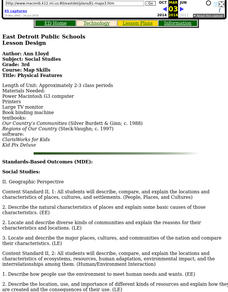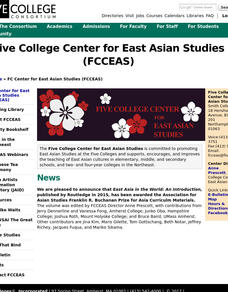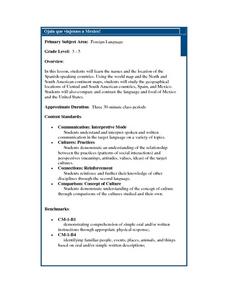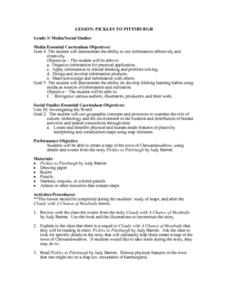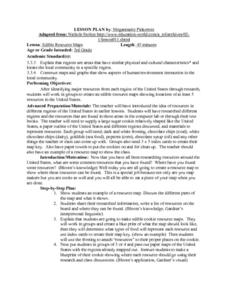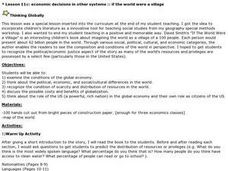Curated OER
2.0 "Water Is Life" Global Water Awareness Mini-Unit (Grades3-5)
Students study the amount of potable water on the Earth. In this water lesson, students examine the amount of potable water as compared to all the water on the Earth. They discuss why many parts of the world do not have access to good...
Curated OER
US Geography, The Blues
This instructional activity enables teachers to use blues styles and performers to think about various geographical regions of the United States. By studying different blues styles from the Mississippi Delta, Texas, and the Piedmont...
Curated OER
My Important Place
The story of Chief Joseph and the Nez Perce Indians of Oregon is told here. Pupils are shown pictures of the ancestral lands of the Nez Perce, and they learn about how they were forced to leave it. Students complete an essay which...
Curated OER
Physical Features
Students draw physical land features using ClarisWorks or Kid Pix, write their definitions, create slideshow, and create class geography book.
Curated OER
What I Did On My Summer Vacation
Students use the internet to research the location of their summer vacation trip. Given the demographics, they plot the location on a world map. They create a brochure using the information they collected. Using PowerPoint, they develop...
Curated OER
Everybody Cooks Rice
Students read the book, "Everybody Cooks Rice," and they participate in activities pertaining to the book. They identify countries mentioned in the text and locate them on a world map. They use an atlas to identify the climatic...
Curated OER
Around the World Alphabet Book
Students explore the online dictionary portion of the EnchantedLearning.com website. They copy pictures and text to create an on-going, student-created classroom book which exposes them to different countries, cultures, animals, etc.
Curated OER
Haiku
Pupils study various forms of poetry and the culture of Japan. They are introduced to a haiku- a traditional form of poetry and an art form in the Japanese culture. They write a haiku and create a student haiku booklet with the classes...
Curated OER
Children in the United States and Japan
Students locate Japan on a map or globe and describe the relative location of Japan. They use the Internet to investigate cultural characteristics of children in the United States and in Japan. They use a Venn Diagram as an...
Curated OER
The City of New Haven
Students examine the geography, politics and history of their local town of New Haven, Connecticut. Using the internet, they explore the neighbors of New Haven and write directions from their house to school. In groups, they research...
Curated OER
Ojala que viajemos a Mexico!
Learners research the names and locations of Spanish speaking countries throughout the world. They use a world map to become familiar with the locations of these countries and use the Internet to conduct further research. They sing...
Curated OER
Pickles to Pittsburgh
Third graders explore the geography in the book "Pickles to Pittsburgh" by Judy Barrett. They read the story and identify the physical features of the town, discuss the elements included on a map, and create a map of the town of...
Curated OER
Edible Resource Maps
Third graders work in groups to create an edible resource map showing locations of at least five resources in the United States. Students research on the internet different regions and the resources that are found in those areas. They...
Curated OER
Pen Pal Letters to Soldiers Overseas
Students write letters to soldiers overseas with correct spelling, grammar, punctuation, and capitalization. They learn three facts about the geography of the area where the pen pal is located and about the pen pal.
Curated OER
Celebrate Your Heritage
Students investigate what countries their ancestors originally came from and locate them on a world map. They use a map to plot the ancestral path that has led to their hometown. They create a travel log outlining facts/data about...
Curated OER
Jr. Chef Club Making Brainy Breakfasts
Young scholars identify the benefits of eating a nutritious breakfast. In this nutrition activity, students read food labels to identify foods that are low in sugar. Young scholars create a healthy breakfast by using eggs and low-fat...
Curated OER
Mariachi Mania
Students play the beats of mariachi music. In this mariachi lesson plan, students listen to mariachi music and discuss why music is important.
Curated OER
Landmarks in Paris
Third graders create a map of France. They use computers to view an "in flight" movie about Paris. They research Paris using books and the internet. Students practice using the program "Comic Life." They import illustrations for each of...
Curated OER
If the World Were a Village...
Your class members explore concept that the world is a large place, examine how statistics can be used to help in understanding the world and its people, and create illustrations or graphs of statistics found in the award-winning...
Curated OER
Mapping Perceptions of China
Pupils discuss what types of things are included on a map. They compare and contrast maps of China with a map they create and practice using different types of maps. They write analysis of their classmates maps.
Curated OER
The Clever Monkey Rides Again
Students explore a West African folktale. In this folktale lesson, students read the book The Clever Monkey Rides Again and discuss the trickster characters from the tale. Students participate in a discussion about the folktale and...
Curated OER
A Tale of Two Towns
Students compare their community and region with other communities around the world. In small groups they complete a questionnaire about life in their community and correspond with e-pals, take digital pictures, conduct research on...
Curated OER
Native Americans - People of the Plains
Learners explore Plains Indians and practice computer skills by reading creation and migration stories on People of the Plains CD-ROM, and watching Plains video. Students examine village life of Plains Indians, and view different...
Curated OER
Ancient Cultures
Students develop archeological skills in order to explain how scientists determine what ancient cultures were like. They develop an appreciation of the work that is involved in finding out about our past.



